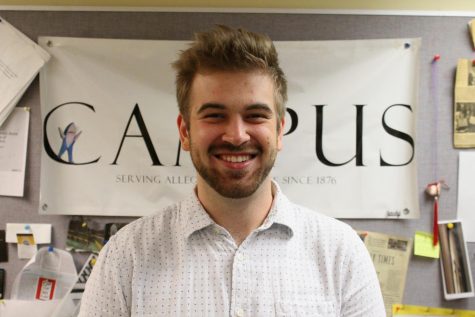Allegheny’s liquor license
Future plans still unsure
Allegheny College has acquired a liquor license, raising questions of its use and how it could affect future student policy.
On Thursday, Nov. 3, The Meadville Tribune reported that the transfer of the liquor license of the former Mad Hatters Southwest Grill LLC to Allegheny College was approved by the Pennsylvania Liquor Control Board.
The cost of the transaction was $130,000, according to the PCLB application. The Meadville Tribune reported that since the license was transferred between two entities in the same municipality, the PCLB required no public hearing.
The college had tried in the spring to purchase a license from West Mead township and transfer it to the college’s address in Meadville. However, the Meadville City Council voted down the transfer 5-0, stating the transfer would “negatively and adversely affect the welfare, health, peace, and morals of the municipality of the City of Meadville and its residents,” according to previous reporting by The Campus
Johnson said she had only heard of positive experiences and feedback from students, faculty and staff who attended alcohol-serving events throughout the previous academic year.
“The advice given at that meeting was to wait and apply for a license that was already within the city’s jurisdiction, which is exactly what we did,” said Vice President for Enrollment Management Ellen Johnson.
The college previously used the license of Parkhurst Dining — Allegheny’s previous food service provider — to host the pop-up pub in Reis Hall’s “The Sycamore” events and the beer garden at the Robertson Athletic Complex.
Johnson referred to obtaining a liquor license as “the next step.”
“There are many colleges across the country who have permanent pub spaces on their campuses, so we would also look to best practices from other institutions on how to do it in the way that’ll work for our community as well,” Johnson said.
Johnson specified that the address of the Henderson Campus Center is attached to the license, though decisions about the creation of a permanent, alcohol-serving space are yet to be made.
“I would anticipate that this spring, we’ll bring together a group of folks to do that,” Johnson said. “We absolutely will look for student input into the process, so this isn’t administration making a decision for students, or for the community, we would be looking at opportunities for community engagement in the process and making a determination as to what we want the space to be, how we want to move forward.”
The current alcohol policy on campus states that no student, regardless of age, is permitted to have an alcoholic beverage “in any non-residential building, outside, and in any public areas of residential buildings including porches, corridors, lounges, study rooms, and bathrooms except when written approval is received in advance from the Dean of Students,” and that open containers of alcohol are strictly prohibited outside of residential rooms and houses or approved events.
Policy further notes, though, that “in accordance with state law, alcoholic beverages may not be sold on campus except by licensed vendors.”
ASG Co-Directors of Student Affairs Cam Lesher, ’24, wrote in an email to The Campus that they were not sure how a liquor license may interact or modify those policies.
“I also find it jarring to think that student organizations or FSL might be able to go through the college to sell alcohol,” Lesher wrote. “Current ASG policies do not allow club funds to be used for the purchase of alcohol, but with changes made to the college policies, discussions about what ASG might do could come up.”
Johnson said there will be a conversation about changes to the student handbook and policy in the future when the college begins rolling things out.
Although the up-front expense for the license seems large, Johnson explained, the college expects to reap long term benefits from it.
The license provides the college the opportunity to not only serve alcohol, but also operate as their own catering entity, which Johnson said could potentially allow for pop-up events like “The Sycamore” to occur without having to spend excess funds on third-party vendors.
Johnson also explained that with the license, Allegheny also has the opportunity to reach beyond the college’s borders.
“Ultimately, the goal is that by having the liquor license, both it’s part of our overall community engagement and opportunities for students, and in the long run, there may be opportunities to open up to the larger Meadville community at sporting events to make revenue as well,” Johnson said.

Roman Hladio is a senior from Wexford, Pennsylvania. He is studying English with a creative writing emphasis, and completing requirements for a Journalism...

Sami Mirza is a senior from many different places. He is majoring in International Studies with a focus on the Middle East and North Africa and minor in...









Al Coppolo ‘78 • Nov 11, 2022 at 9:39 pm
A November 4th Campus article discusses the Wi-Fi issues that plague the college. It refers to an eleven year old controller at the core of the network as the source of the latest network outages. The $130,000 investment spent on a liquor license could have replaced this piece of hardware and likely other deferred maintenance that is handicapping the college. It’s a shame that a liquor license is now the best investment to restore the college’s competitiveness.
Al Coppolo ‘78